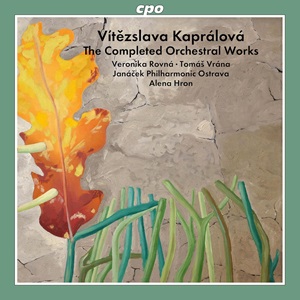
Vitězslava Kaprálová (1915-1940)
The Completed Orchestral Works
Suite en miniature, Op 1 (1935)
Military Sinfonietta, Op 11 (1937)
Suita rustica, Op 19 (1938)
Waving Farewell, Op 14 (1937)
Prélude de Noël (1939)
Fanfare (1939)
Partita for piano and strings, Op 20 (1939)
Piano Concerto in D minor, Op 7 (1935)
Veronika Rovná (soprano)
Tomáš Vrána (piano)
Janáček Philharmonic Ostrava/Alena Hron
rec. 2022, Ostrava House of Culture, Ostrava, Czechia
cpo 555 568-2 [2 CDs: 103]
The subtitle of this twofer is ‘The Completed Orchestral Works – ‘completed’ not complete, as it doesn’t include those works that Kaprálová left unfinished. We don’t get, for instance, Sad Evening (Smutný večer), which you can find on Naxos in its première recording, as the orchestration of the final bars was reconstructed by Timothy Cheek.
The core of her achievement orchestrally lies in the Military Sinfonietta, the Partita for Strings and the Piano Concerto. It was the Military Symphony (1937) that first brought her to prominence, and it’s performed here with a regrettably slack sense of characterisation and development, which is disappointing as the performers are the Janáček Philharmonic Ostrava under Alena Hron. Where are the Janáček-inspired brass calls? Why is the performance so lumpy and static, with a lack of bite? The Naxos performance takes a far better tempo but is played by a student orchestra, so neither will do. Turn instead to a master of Janáček performance, František Jílek with the Brno State Symphony on Studio Matouš.
The Piano Concerto has been increasingly recorded over the last few years. Naxos’s performance is again compromised, whilst the recent Supraphon recording is in another class. Tomáš Vrána is CPO’s pianist and plays with admirably fleet fingers, but the recording is not as detailed as Supraphon’s nor is the performance as romanticised. If you want to delve deeper with this youthful concerto, seek out Alice Rajnohová with Tomáš Hanus and the Bohuslav Martinů Philharmonic on Radioservis; they are the most youthful and athletic of all.
Vrána also appears in the performance of the Partita for piano and strings of 1939. This three-movement work is one of her most impressive large-scale statements and certainly the most Martinů-like of her works. His neoclassical cadences haunt the opening Allegro energico and the pianist brings out these elements well. Where the performance loses is in the central movement where, though sensitive to string colouration and mood, it sounds much more of an Andante or even Adagio than the marked tempo of Andantino. I’m afraid the benchmark here is again Jílek, with pianist Jiří Skovajsa, on the disc already cited [MK 0049-2 011], who manage to find the veiled quality but also, crucially, the freer tonality implicit in the music.
Waving Farewell (Sbohem a šateček) is a brief orchestral song with words by the poet Vitězslav Nezal (1900-1958) and it’s well sung by Veronika Rovná. But – and I’m sorry to do this, again – turn to the great tenor Vilém Přibyl, with Jílek, and you’ll hear a more fluid performance with greater attention to verbal nuance.
The remainder of the programme gathers up those lighter pieces that remain from her sadly small catalogue of orchestral works. This includes the Suite en miniature, a delicious example of her richly expressive writing, burnished with impressionism, and a lightly spiced use of folkloric influence. The piece is actually rooted in her Suite for Piano, which is included in the second disc and with which it shares an opus number, Op 1.
This is a useful collection of Kaprálová’s orchestral music. Superior, alternative recordings may not be easy to come across, so the intelligently written notes and unproblematic recorded quality will act in its favour.
Jonathan Woolf
Buying this recording via a link below generates revenue for MWI and helps us keep free access to the site



















